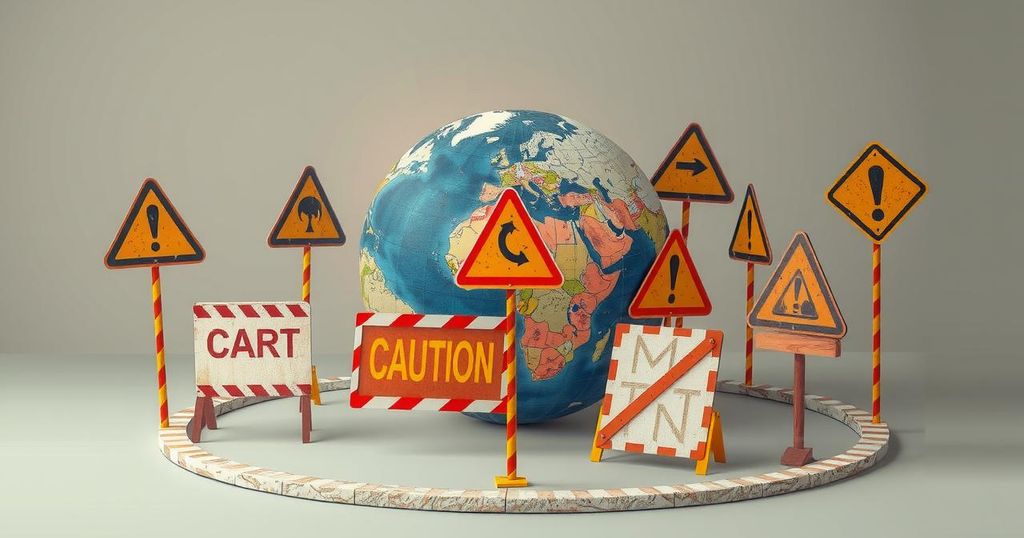Trump Announces Travel Ban on Haiti, Cuba, and Venezuela Amid Immigration Policy Shift
President Trump’s latest travel ban restricts entry for Haitian nationals and partially limits travel for Cubans and Venezuelans, effective June 9, citing national security concerns. The ban has sparked criticism from human rights groups and community leaders, who argue that such measures are discriminatory and detrimental to family ties. The ongoing crackdown on immigration reflects a broader tightening of U.S. immigration policies and raises concerns about humanitarian impacts.
In a significant shift in immigration policy, President Donald Trump has announced a travel ban targeting individuals from Haiti, Cuba, and Venezuela, as part of a broader immigration crackdown. Effective June 9, the ban imposes a complete entry restriction on Haitian nationals while partially limiting visas for Cubans and Venezuelans. This move is part of the administration’s ongoing effort to tighten visa requirements for certain countries deemed high-risk.
The White House issued a proclamation stating it is necessary to “fully restrict and limit the entry” of Haitian citizens and “partially restrict” those from the other two nations. This marks a continuation of the government’s efforts since Trump requested a review of the vetting processes for immigrants from countries he deemed insufficiently secure. The repercussions of this proclamation include suspending the issuance of most immigrant and non-immigrant visas for these nations.
Visa categories affected include those used for tourism, business, education, and other non-immigrant purposes. There are some exceptions: for instance, individuals currently holding valid visas will not be affected. Additionally, the ban does not apply to green-card holders, dual nationals with non-designated passports, and immediate relatives of U.S. citizens.
The proclamation encompasses a broader array of nations, fully banning nationals from countries including Afghanistan, Iran, and Libya while implementing partial bans on nations such as Burundi and Turkmenistan. The administration has emphasized the need for vigilance in the visa issuance process as a means of safeguarding national security.
Concerns have been expressed by various groups following the announcement. At the Haiti Funders Conference in Boston, Brian Concannon from the Institute for Justice and Democracy remarked on the discriminatory nature of the targeted ban. He stated, “Singling Haiti out for special treatment provides no protection to U.S. national security, but is another in a long line of transparently racist attacks against Haitians.”
Trump defended the bans by citing terrorism and crime as reasons for the restrictions, expressing concerns over the inability of these countries to manage travel documents effectively. The situation is particularly challenging for Haitians, as the U.S. Embassy hasn’t processed visa applications in Port-au-Prince for two years. The timing of the ban coincides with a decision regarding the fate of over 500,000 Haitians currently benefiting from Temporary Protected Status, which could cause additional strain on U.S.-Haitian relations.
Community leaders like Pierre Imbert voiced their worries, noting that this ban disrupts ties between Haitians and their families in the U.S., saying, “Access to the United States is key to sustaining families. Banning them from accessing the country is yet another chapter in the tragedy of Haiti.”
Furthermore, critics have pointed out the complexity of the situation for Venezuelans and Cubans as well. The administration’s stance toward Cuba includes labeling it a state sponsor of terrorism, while Venezuela’s lack of proper vetting measures for travelers has raised alarms. Yet, reports have shown that thousands of Venezuelans had been deported back since the beginning of the year, raising questions about the validity of the administration’s claims.
Adelys Ferro from the Venezuelan American Caucus denounced the ban as steeped in racism, saying, “They didn’t even try to hide the racism, discrimination and xenophobia when drawing up this list.” Human rights organizations echoed this sentiment, urging that the ban fundamentally undermines the principles of national security and humanitarian protection.
This latest measure is not the first travel ban initiated during Trump’s presidency, with similar restrictions introduced in 2017 against several Muslim-majority countries. The recurring theme in these policies has been their potential to exacerbate divisions in society and overshadow the contributions of immigrants from these nations, often fleeing hardship.
The new travel ban imposed by President Trump restricts entry for nationals of Haiti, Cuba, and Venezuela, citing national security concerns. With implications for over 500,000 Haitians currently protected under TPS, community leaders and human rights activists have criticized the measure as racist and detrimental to familial ties. This action reflects ongoing tensions in U.S. immigration policy and highlights the challenges faced by immigrants from countries affected by violence and political instability. As evaluations of these bans undergo periodic review, advocates fear future restrictions may continue to disproportionately target vulnerable populations.
Original Source: www.yahoo.com




Post Comment